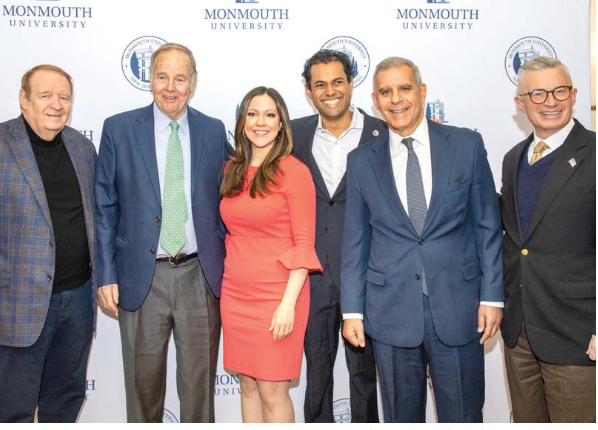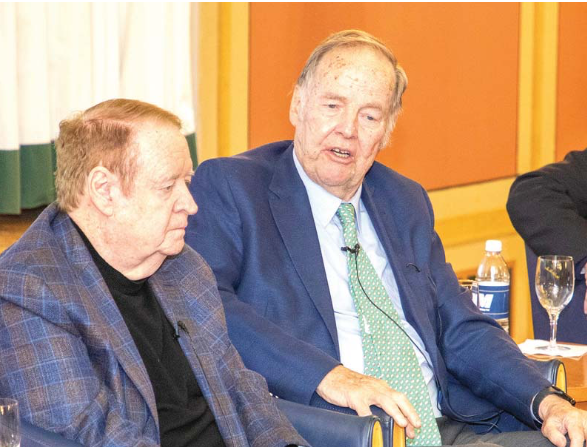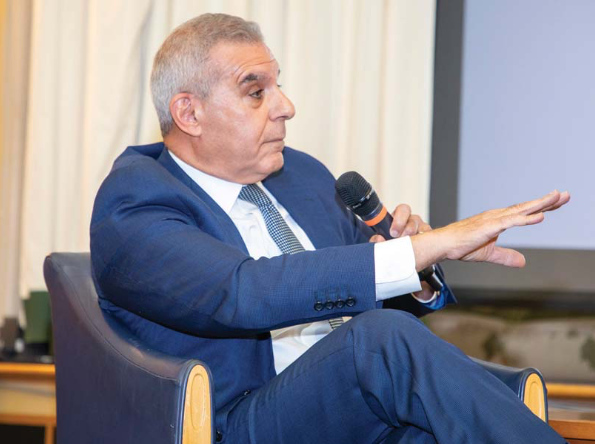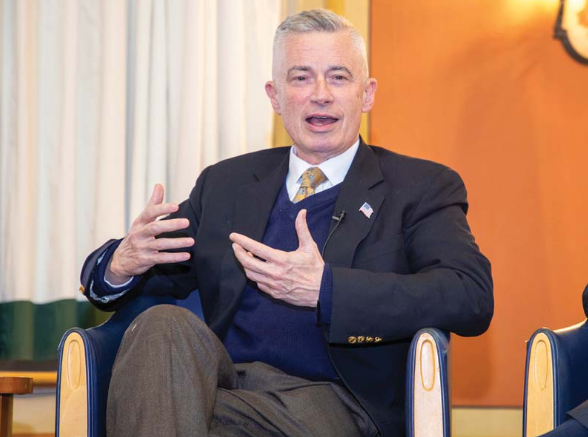
By John Spinelli and Elizabeth Wulfhorst
WEST LONG BRANCH – Before a capacity crowd in The Great Hall Auditorium at Monmouth University, current and former New Jersey legislators gathered to discuss the breakdown of civility and bipartisanship in politics.
On April 3, state Sen. Vin Gopal (D-11) and former state Sen. Joseph Kyrillos (R-13) returned to lead the second discussion in the series Leadership, Civility, and Common Ground in Politics and Public Service. The inaugural discussion was held March 2.
This month’s theme was We Are Not Enemies, But Friends (Lincoln): Reclaiming Civility in Our Public Discourse and featured three former New Jersey governors, Republican Thomas Kean and Democrats James McGreevey and Richard Codey. The talk was moderated by NJ Spotlight News anchor Briana Vannozzi.
Kean was the 48th governor of the state, serving from 1982 to 1990. He was a state Assembly member from 1968 to 1978 and Assembly speaker from 1972 to 1973. In 2002, President George W. Bush appointed Kean chairman of the 9/11 Commission. McGreevey was the 52nd governor, serving from 2002 until his resignation in 2004. He served in the Assembly from 1990 to 1992 and in the state Senate from 1994 to 1998. Codey was the 53rd governor, serving from 2004 to 2006. He was a state Assembly member from 1974 to 1982 and a state senator from 1982 until this year. He was president of the Senate from 2002 to 2010.

In a spirit of bipartisanship, the panelists were introduced by College Republicans chairman Jacky Bruno and College Democrats president Owen Bros.
Vannozzi opened the discussion by telling the audience a little about the panelists’ accomplishments. “If it weren’t for these three gentlemen today, you wouldn’t be allowed to become a teacher unless you only majored in education; there would still be indoor smoking; many of our current state lands would not have been preserved; and there would be no MetLife Stadium,” she said.
Kean attributed many of his accomplishments as governor to the help he received from his predecessor, Democrat Brendan Byrne.
“I came in with a Democratic Legislature and a $6 billion deficit,” he said, noting the difficulties, even then, of divided government. But Byrne put party affiliation aside for the betterment of New Jerseyans, Kean said. Byrne let Kean know whom to work with and whom to avoid when it came to getting legislation passed.
“We didn’t always agree, but Byrne helped me to negotiate as governor,” Kean said.
“After we both finished in politics, we became very close friends.”

Kean suggested one way to encourage bipartisanship is to have cabinet members from the opposite party serve a governor or even the president to promote a forced cooperation.
“They are the things that change America for the better,” Kean said.
“Republicans and Democrats didn’t have a choice and had to work together” on the 9/11 Commission, Kean pointed out.
“We ended up with a tough proposal to bring to Congress and we had harsh opposition from the Pentagon,” but they got it done.
McGreevey said part of the problem seems to be the “civility of the individual.”
In the past, “the right kind of people… could find common ground,” he said.
“Civility really is up to everybody,” Kean added, noting the only time he was overridden as governor was by Codey who was the majority leader at the time. Codey asked permission before requesting that override, Kean said. “He didn’t want to ruin our relationship. You would never see that today.”
Codey governed with a 50-50 split in the Legislature, with Little Silver resident and former Republican Majority Leader John Bennett the powerful deal breaker. During his short time as governor, Codey had to work with the other side to get anything accomplished.
Kean criticized current Democrats for not inviting Republicans to closed-door meetings that often occur after the Legislative session.

When Kean served, he said, “We would have dinner together” and attend funerals and weddings “regardless of party affiliation,” something he would like to see a return to.
“I don’t know how it’s become this bad,” he said.
McGreevey, who retired from politics two decades ago but is now running for mayor of Jersey City, noted not all division is about politics; sometimes it’s simply a personality clash. He said when he was in the Legislature, the Democratic Speaker would give the gavel to a Republican if he had to leave the chambers. When he asked why, the Speaker said he hated the second-in-line member of his own party.
“Sometimes it’s just about personality. My advice is, ‘Look past politics and be friends with someone on the other side,’ ” McGreevey said.
Discussion leader Kyrillos said the big problem today is that redistricting has made races less competitive for both parties.
“I think you are a better candidate if you have to appeal to Independents as well as Democrats and Republicans. Back then, if you didn’t appeal to all voters, you weren’t going to win,” Kyrillos said.
“There are people becoming successful on both the extremes of the right and left. There seems to be no room for moderation anymore.”
McGreevey blamed a politically biased media for the increased polarization.
“My father and our family would watch the same news as our neighbors. There was a sense of a common platform,” he said. Now there are so many platforms to choose from you can effectively create an echo chamber, only hearing the political ideas you agree with.
Discussion leader Gopal told the young audience he thinks social media has negatively affected society, even more so in the political world. Behind a screen, people can say whatever they want without much fear of repercussions. As an example, he noted the rancorous and often racist comments made about women’s college basketball players during the recent NCAA tournament.
Gopal lamented the fact that legislators don’t seem to be as interested in solving the problems facing many of their constituents anymore.
“I’ve seen so many changes in my seven years in the Senate; we’re not talking about real issues like insurance rates or affordability.”
During a Q&A period, one audience member said an issue not mentioned by the panel was racism in New Jersey today, noting there are currently more black elected officials in Mississippi than in New Jersey. She also pointed to “indirect segregation” in the state’s public school districts.
All panelists agreed it was an important issue the state needs to fix.
“The biggest lesson I learned (from the panel discussion) is that without cooperation in Trenton, constituents will horribly suffer,” said Monmouth University student Claire Gaston from Union Beach. “In future elections, politicians should understand there needs to be bipartisanship and civilized debate.”
When asked to give advice to future voters, the former governors mostly expressed an optimistic outlook for the country.
McGreevey reflected on the country’s history as he looked ahead to this year’s election. “The United States is an idea,” he said. “We’re unique because our identity is enshrined in these two documents (the U.S. Constitution and the Declaration of Independence).”
“We get back what we give – this is our American experience. We may not have 2,000 years of history, but we have the greatest experiment of a living and functional democracy.”
“I look at some of you, maybe voting for your first or second time,” said Kean. “It’s up to you men and women as citizens to establish political tolerance and decency in your communities.”
Codey, a staunch Democrat, surprised many in the audience by predicting a Trump victory in November and warned the audience the election will “define the country.”
“Whoever wins, I just hope the next president will bring us together and not tear us apart.”
The article originally appeared in the April 11 – April 17, 2024 print edition of The Two River Times.














